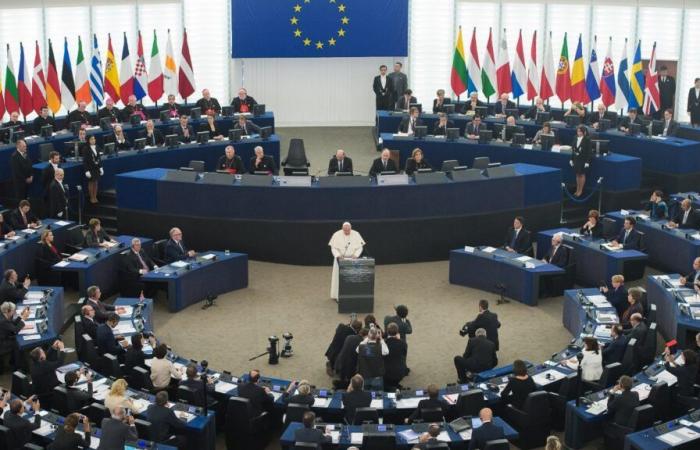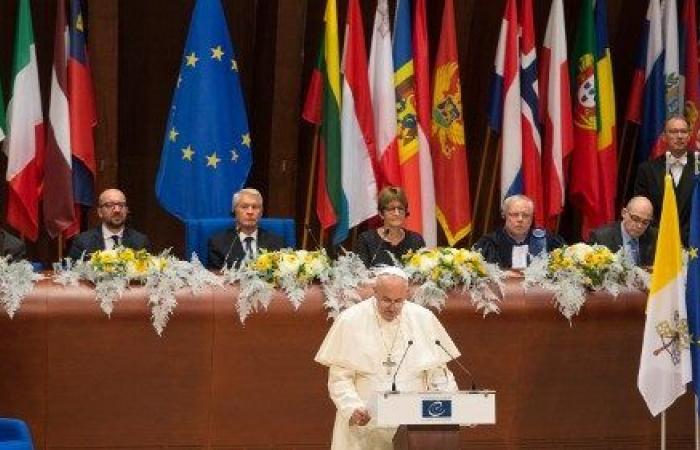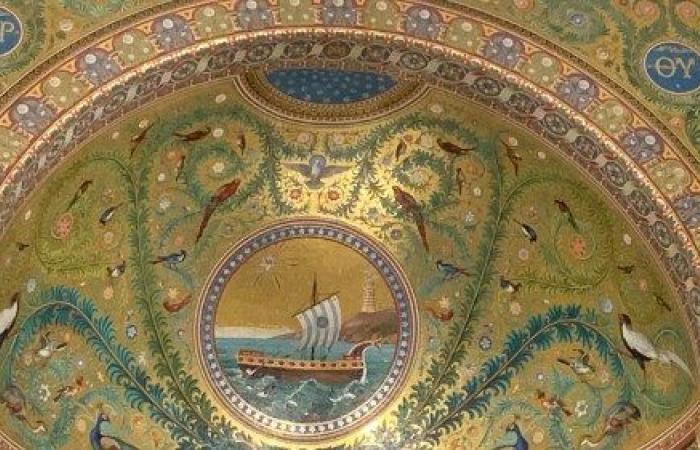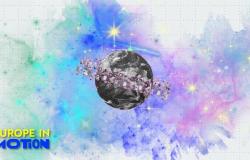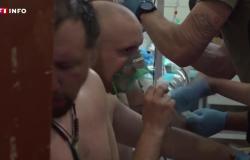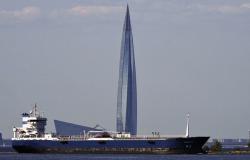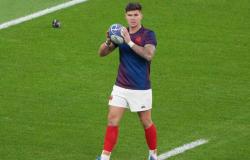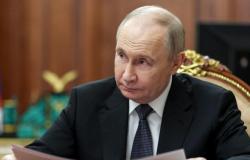From Strasbourg to Lampedusa, including the 60th anniversary of the Treaty of Rome celebrated in the Vatican, pope Francis has had a strong relationship with the European Union and its member states. Back on the legacy left on the old continent with Mgr Antoine Hérouard, first vice-president of the Comece.
Interview carried out by Alexandra Sirgant – Cité du Vatican
Originally from the other bank of the Atlantic, François was the first non -European pope to access the throne of stone for more than a millennium. If the Argentinian pope was keen to turn to the outskirts and to make the Catholic Church less Eurocentre, he remained very attached to the old continent, by greeting humanist and Christian values on several occasions which have served as the basis for his unification. Of the 47 pastoral visits to the Holy Father for the past twelve years, 17 have been carried out in member states of the European Union. During these trips, François will not hesitate to express themselves on several major subjects for the EU such as the reception of migrants or the war in Ukraine. Interview with Mgr Antoine Hérouard, first vice-president of the European Union episcopates commission (Comece) and Archbishop of Dijon.
What do you remember from François’s pontificate?
More generally, what I remember from the Pontificate of François is his rooting in the Gospel and an understanding of the Gospel in faith, proximity and in attention to the smallest and the poorest.
As vice-president of the Comece, and the European Union episcopates commission, I can also highlight Pope Francis’ commitment on European issues. It has often been said that this pope who came from South America was not very interested in Europe or had a somewhat negative vision of Europe. I think this is not true and that, on the contrary, even if it is not where he made the most pastoral trips, he closely followed European news and European construction.
He also wanted to awaken Europe, compared to its own values and what is expected of it in the world. I am thinking of his speeches in the European Parliament and the Council of Europe in 2014, but also when he received the International Charlemagne Prize in 2016, which is still the recognition by the various European institutions of the important role of the Pope vis-à-vis Europe. There was also the anniversary of the Treaty of Rome in 2017, in Rome precisely, where he received the heads of state and government from all the countries of the European Union. And then, still in 2017, the speech to the participants in the conference “(re)Thinking Europe» [(Re)penser l’Europe] which had been organized jointly by the Secretary of State and the Comece, proof of his very strong commitment at European level.
You mentioned his speaking in the European Parliament on November 25, 2014. During this speech, François will not hesitate to challenge European leaders by speaking of a Europe which is like “a grandmother”, “respectable, rich in experiences”, but “which is no longer fertile”. What trace is it leaving on the continent by his speaking?
I think that Pope Francis has had the advantage of highlighting a certain number of fundamental questions around European construction, such as “What are we looking for? ”. I would like to recall that European construction was initiated after the Second World War by the founding fathers, many of which were Christians. They sought to build solidarities to guarantee peace in Europe. Today, through the Russian invasion in Ukraine, we see that the war returns to the European continent. It is at our doorstep, and this may give us a particular responsibility, even greater to work and defend peace in Europe.
Then, in the way in which the Pope also rocked certain received ideas or certain ways of conceiving Europe, he wanted to remind us that Europe was based on important values and on dynamism, and that this dynamism should not be dropped.
I think the Pope was also very concerned about the demographic question in Europe, because we see that Europe is aging and that’s why it used this image [de «grand-mère»]. This leads to migration from the outside, but also intra-European migrations within a number of countries in the East European. I am thinking of Bulgaria, Romania and other countries where the population has decreased in recent years because the youngest and more educated will seek work and a future in the Western Europe, which weakens these countries.
The very first trip of François’s pontificate was to Lampedusa in 2013 to talk about the migratory question in the Mediterranean. Throughout his pontificate, he worked to remind European capitals the common values of solidarity and humanism. What’s left today?
The Pope did not propose a migration policy, it is the responsibility of the States and the European Union. But he wanted to recall something that is absolutely fundamental is that we cannot deal with these migration issues simply through statistics, through numbers. He invited to always look at migrants and those who came to find refuge in Europe as people who, as such, must be respected, welcomed, accompanied, and then integrated.
You also said it earlier, his pontificate was marked by the return of war in Europe. Is this one of the challenges will face his successor? What are challenges awaiting the Church in Europe?
There is this question of war and peace. There is also the fact that so far, the whole issue of European security has largely reached the United States. With the current presidency of Donald Trump, we see that things are changing very quickly and that European countries will undoubtedly have to think their own security and also engage in rearmament efforts. So obviously, it also raises questions for the Church: one can encourage peace rather than to engage very important sums in armaments, and at the same time, we can also say that if Europe does not have the means of its own defense, then it will not be able to defend and promote its ideals and its ideals. We can also remember what Pope John Paul II said in his time, even if the times are different: there is no peace without justice, and there is no justice without respect for rights.
It is clear that today we are in a world where the main powers make little case of the international order, the UN, all that we have sought to build over time to regulate conflicts and international relations. But perhaps that, precisely, Europe must be able to affirm today its own values around democracy, around the rule of law, around a certain understanding also of the respect of the poorest. And basically, perhaps Europeans are not sufficiently aware of this today, that is to say that we look at our own problems and we seek to solve them, but it should not be done in a purely selfish way. It must also be said that many countries today in the world are weakened by this considerable modification of world balances, between the United States, Russia and China, and that these countries may seek other compasses and other points of support. This is where Europe must be able to promote its own values.
Is there in Europe special expectations on the profile of the next pope?
We will of course welcome the Pope that the cardinals will have chosen with the help of the Holy Spirit. This pope will be European or not European. Finally, this is not that the primordial question, but it is to say that inevitably, the Pope has a universal responsibility but he is also the bishop of Rome, and he has a special role on our continent, since he lives there. So this also assumes that the Pope can understand, host and guide the issues that are those of Europe today.

